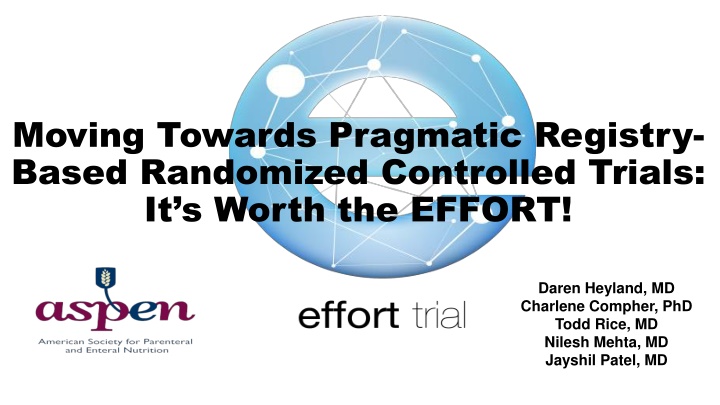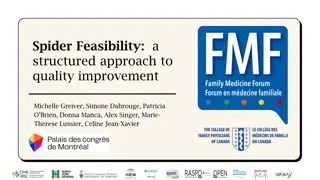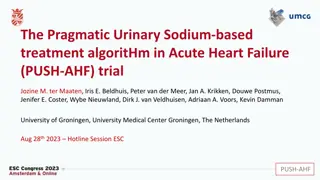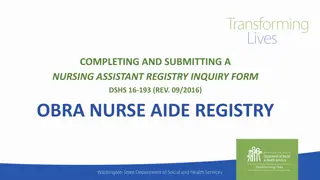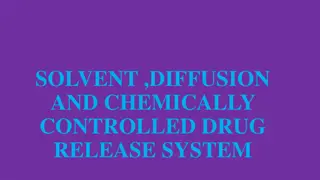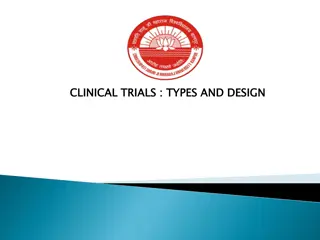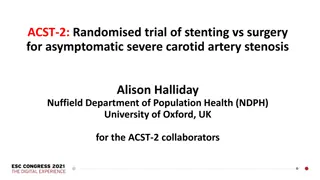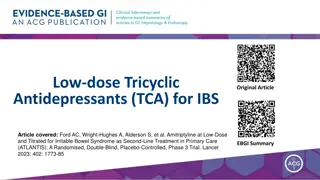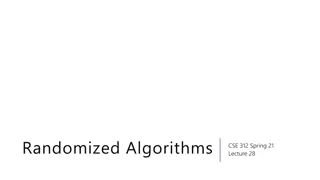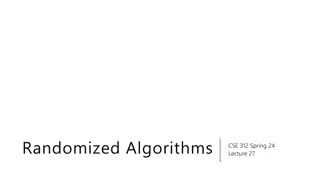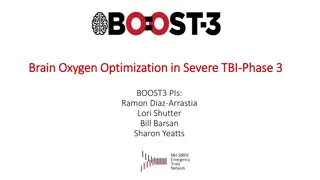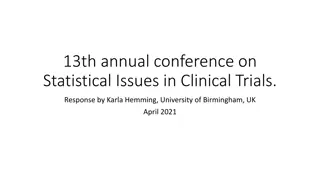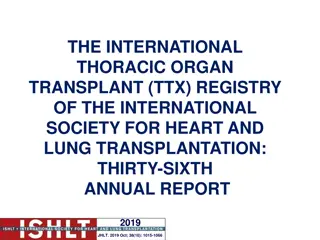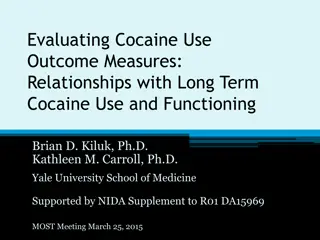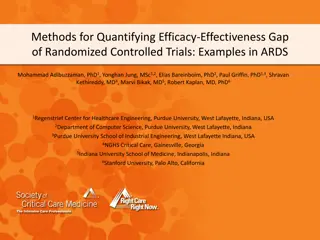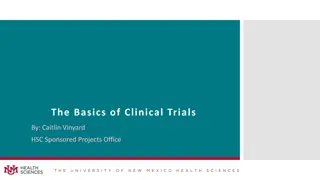Moving Towards Pragmatic Registry-Based Randomized Controlled Trials: Worth the Effort
This content delves into the significance of pragmatic registry-based randomized controlled trials in critical care nutrition, protein dosing, and outcomes in the context of intensive care units across various countries. It discusses the EFFORT trial, waiver of consent, protein dose recommendations, inferences from scientific research, and the quality of evidence. The content also provides insights from a five-year survey participation involving 708 ICUs globally, shedding light on international nutrition practices and patient outcomes.
Download Presentation

Please find below an Image/Link to download the presentation.
The content on the website is provided AS IS for your information and personal use only. It may not be sold, licensed, or shared on other websites without obtaining consent from the author.If you encounter any issues during the download, it is possible that the publisher has removed the file from their server.
You are allowed to download the files provided on this website for personal or commercial use, subject to the condition that they are used lawfully. All files are the property of their respective owners.
The content on the website is provided AS IS for your information and personal use only. It may not be sold, licensed, or shared on other websites without obtaining consent from the author.
E N D
Presentation Transcript
Moving Towards Pragmatic Registry- Based Randomized Controlled Trials: It s Worth the EFFORT! Daren Heyland, MD Charlene Compher, PhD Todd Rice, MD Nilesh Mehta, MD Jayshil Patel, MD
CURRENT STATE OF CRITICAL CARE NUTRITION AND PROTEIN DOSE What is the EFFORT trial? Waiver of Consent
CURRENT STATE OF CRITICAL CARE NUTRITION AND PROTEIN DOSE
Protein and Critical Illness Proteolysis Proteolysis Patel JJ Crit Care Clin 2016;32:173-89.
Making Inferences from Scientific Research Strong Clinical Recommendations! None-weak inferences Strong Inferences! LOTS OF BIAS LITTLE BIAS Randomized controlled trial Systematic Reviews Cohort Studies Case Control Case Series
Protein Dose and Outcomes IDEAL Protein dose and function / illness Protein dose and mortality -Rugeles et al. J Crit Care 2016 Oct;35:110-4. -Ferrie et al. JPEN 2016;40:795-805. 2016 ASPEN/SCCM guideline 2016 ASPEN/SCCM guideline suggests suggests 1.2 1.2- -2.0 g/kg ABW/day 2.0 g/kg ABW/day Protein dose and muscle mass Protein dose and nitrogen balance -Alberda et al. Int Care Med 2009;35:1728-1737. -Kutsogiannis et al. Crit Care Med 2011;39:2691-2699. -Allingstrup et al. Clin Nutr 2012;31:462-468. -Weijs PJ et al. JPEN 2012;36:60- 68. -Weijs PJ et al. Crit Care 2014;18:701-714. -Compher C et al. Crit Care 2017;45:156-163 Quality of Evidence -Ishibashi N et al. Crit Care Med 1998;26:1529-1535. -Casaer et al. Crit Care Med 2013;41:2298-2309. -Puthucheary et al. JAMA 2013;310:1591-1600. -Larsson J et al. Br J Surg 1990;77:413-416. -Iapichino G et al. ICM 1988:14:399-405. -Berg et al. Crit Care 2013;17:R158. Magnitude of Outcomes
Five Year Survey Participation:708 ICUs International nutrition survey -Prospective snapshot of clinical practice Canada: 95 Europe and Africa: 109 USA: 225 Asia: 145 -De-identified data about patients, nutrition practices, and outcomes UK: 37 Turkey: 11 Ireland: 12 Italy: 9 Norway: 8 South Africa: 13 Switzerland: 4 Spain: 4 Slovenia:1 Sweden: 3 Czech Republic:3 Austria:2 Portugal:1 France:1 Colombia:19 Brazil:10 Argentina:7 Uruguay:5 Mexico: 3 Chile:3 Venezuela:2 Peru:1 Paraguay:1 El Salvador:1 Puerto Rico:1 China: 38 Japan: 43 India: 36 Taiwan:5 Singapore: 11 Saudi Arabia:2 Philippines:2 Iran : 2 Thailand: 2 UAE:1 Malaysia:2 Indonesia:1 Latin America: 53 Australia: 73 New Zealand: 8 -Waiver of informed consent Heyland DK et al. Nutr Clin Pract 2017.32:58S-71S
How much protein is PRESCRIBED? LOW RANGE 0.5 g/kg/day AVERAGE 1.3 g/kg/day HIGH RANGE 3.8 g/kg/day LOW RANGE 0.86 g/kg/day SITE MEDIAN 1.2 g/kg/day HIGH RANGE 2.6 g/kg/day Heyland DK et al. Nutr Clin Pract 2017.32:58S-71S
How much protein is ACTUALLY delivered? AVERAGE 55% PRESCRIBED (0.7 g/kg/d) HIGH RANGE 101% PRESCRIBED (1.31 g/kg/d) LOW RANGE 15% PRESCRIBED (0.2 g/kg/d) Heyland DK et al. Nutr Clin Pract 2017.32:58S-71S
At Best: Weak to Moderate Inferences! Strong Clinical Recommendations! Weak to moderate recommendations! None-weak inferences -Alberda Int Care Med 2009;35:1728-37. -Kutsogiannis Crit Care Med 2011;39:2691-99. -Allingstrup Clin Nutr 2012;31:462-68. -Weijs JPEN 2012;36:60-68. -Weijs Crit Care 2014;18:701-14. -Nicolo JPEN 2016;40:45-51 -Compher Crit Care 2017;45:156-63 Strong Inferences! LOTS OF BIAS LITTLE BIAS Randomized controlled trial Systematic Reviews Cohort Studies Case Control Case Series
RCTs comparing High vs. Low Protein Dose in Critically ill Patients
Summarizing The Current Paradigm Protein loss occurs in critically ill patients. Protein supplementation is recommended for ICU patients. Recommendations suggest 1.2 2.0 g/kg/day Recommendations are from observational data Therefore clinical practice has significant variation.
Clinical Equipoise There is not one better intervention present. A true state of equipoise exists when one has no good basis for a choice between two or more care options. Randomized controlled trial needed to resolve clinical equipoise! Lauer MS. 2013 NEJM 369:1579-81
The Effect of Higher Protein Dosing in Critically ill Patients: EFFORT TRIAL A multicenter, pragmatic, volunteer-driven, registry-based, randomized, clinical trial
Randomized Controlled Trial Formats Pragmatic Registry Based RCT Explanatory Limited generalizability Results more generalizable Fail to show a signal of benefit Make causal inferences Very costly Volunteer driven Time consuming Less time consuming Randomize unproven intervention Randomize standard of care Lauer MS. 2013 NEJM 369:1579-81
An Example of a Registry Based RCT Randomized patients undergoing angioplasty to MANUAL ASPIRATION or USUAL CARE Used existing Swedish cardiac registries Over 7000 patients efficiently recruited to evaluate the study question The trial IMPOSED NO OTHER STUDY PROCEDURES! All data were collected by the existing registries No patients lost to follow-up Total COST 300,000 Euros or 50 Euros per patient enrolled! Frobert NEJM 2013 369:1587-97
International Nutrition Survey Infrastructure Canada: 95 Europe and Africa: 109 USA: 225 Asia: 145 UK: 37 Turkey: 11 Ireland: 12 Italy: 9 Norway: 8 South Africa: 13 Switzerland: 4 Spain: 4 Slovenia:1 Sweden: 3 Czech Republic:3 Austria:2 Portugal:1 France:1 Colombia:19 Brazil:10 Argentina:7 Uruguay:5 Mexico: 3 Chile:3 Venezuela:2 Peru:1 Paraguay:1 El Salvador:1 Puerto Rico:1 China: 38 Japan: 43 India: 36 Taiwan:5 Singapore: 11 Saudi Arabia:2 Philippines:2 Iran : 2 Thailand: 2 UAE:1 Malaysia:2 Indonesia:1 Latin America: 53 Australia: 73 New Zealand: 8 Heyland DK et al. Nutr Clin Pract 2017.32:58S-71S
Clinical Equipoise BOUNDARIES OF ICU STANDARDS OF CARE
The Effect of Higher Protein Dosing in Critically ill Patients: EFFORT TRIAL STANDARD OF CARE REGISTRY BASED A multicenter, pragmatic, volunteer-driven, registry-based, randomized, clinical trial
Inclusion and Exclusion Criteria Inclusion Criteria 1. >18 years old Exclusion Criteria 1. >96 continuous hours of mechanical ventilation before screening 2. Expected death or withdrawal of life- sustaining treatments within 7 days from screening 3. Pregnant 4. The responsible clinician feels that the patient either needs low or high protein Rationale for Exclusion Intervention is likely most effective when delivered early 2. Nutritionally high- risk Patients unlikely to receive benefit 3. Requiring mechanical ventilation with actual or expected total duration of mechanical ventilation >48 hours Unknown effects on fetus Uncertainty doesn t exist; patient safety issues
What is required for a waiver of consent? Three components: 1. Minimal risk (common rule) 2. Does not reduce involuntariness of current practice 3. Research could not be practicably carried out without waiver Asch DA. NEJM 2017;377:1412-13
1 Minimal Risk as risk in which "the probability and magnitude of harm or discomfort anticipated in the research are not greater in and of themselves than those ordinarily encountered in daily life or during the performance of routine physical or psychological examinations or tests" Minimal Risk Applies to the research and its processes Asch DA. NEJM 2017;377:1412-13
Does EFFORT meet minimal risk? 1 Misconception: Misconception: There is excessive distinction between research and quality improvement. Evolution of modern medicine is such that clinical research is embedded into learning health systems , a system designed to improve the effectiveness and safety of health care by creating that continuously learning to be better. To the extent that all activities aim to generate reusable knowledge, the distinction is not whether an activity is research but whether it risks harming people. Is the research proposed in EFFORT minimal risk?
Does EFFORT meet minimal risk? 1 1. Clinical equipoise exists for protein dose in critically ill patients. 2. EFFORT is only randomizing protein doses (within the standard of care). 3. If clinical equipoise does not exist for an individual patient, the provider can choose to opt-out of the study. 4. No modifications to usual care will be used. 5. No experimental products will be used. 6. No tissue or blood specimens will be collected for the RCT. 7. Participating sites will not receive payment or incentives. 8. A unique patient ID number will be assigned and no direct patient identifiers will be disclosed to the registry site or in any publication or presentation
Does EFFORT meet minimal risk? 1 9. Data collected for this study will mirror data collected for the INS, a multi- center, multi-national quality improvement collaborative, which has been granted a waiver of consent for more than a decade for >250 ICUs across the United States and >500 ICUs worldwide. 10. Data collected from standard hospital records and there are no study- specific procedures EXCEPT randomization of protein dose. 11. Simply adding a randomization function to these patients in which equipoise exists does not increase the risk and is consistent with minimal risk. Other registry based and pragmatic trials have been granted waiver of informed consent. Two US sites (Vanderbilt and University of Pennsylvania) granted waiver of consent for EFFORT
Does EFFORT meet minimal risk? 1 encountered in daily life or during the performance of routine physical or psychological examinations or tests" Recommended protein to maintain net neural nitrogen balance is 0.6 to 0.9 g/kg/d in healthy humans People on a Western diet consume up to 4 g/kg/d (3 g/kg/day from food and 1 g/kg/day from supplements), totaling 320 g/day WITHOUT adverse consequences reported.
Does EFFORT reduce the involuntariness of current practice? 2 Misconception Misconception: A focus on protecting voluntariness for standard of care trials Currently, patients and their families are not consulted on their protein prescription unlikely anyone would insist that patient A or B provide consent for protein doses X or Y. Deploying standard of care randomization does not increase the involuntariness beyond what was already acceptable. Asch DA. NEJM 2017;377:1412-13
Does EFFORT reduce the involuntariness of current practice? 2 Misconception Misconception: Equating the ease or courtesy of requesting consent with the need or appropriateness of doing so. Success in achieving behaviors might come more easily to the people (in this case, clinicians) who are motivated to obtain consent to a trial. Consent requirements can make low-risk trials LESS rather than more ethical if the bias they create undermines the trial s value. The test or practicability is not whether investigators can logically confront patients to request their consent, but whether they can do so while preserving the trial s validity. For a real practice pragmatic study such as EFFORT high risk of limiting generalizability if consent is required Asch DA. NEJM 2017;377:1412-13
EFFORT could not be practicably carried out without a waiver. 3 1. Integrated consent is the alternative to the learning health model. 2. Integrated consent model is not practicable in the mechanically ventilated critically ill patient, often sedated and unconscious requires verbal conversations at the point of decision making. Impracticable because initiating protein is time-sensitive. Impracticable because protein dose (wide standard of care) is not discussed with patient or family. 3. No funding is available for this registry based volunteer-driven trial. Impracticable because the trial will rely on motivated clinicians to obtain informed consent and can lead to a selection bias, severely limiting generalizability of the trial. Asch DA. NEJM 2017;377:1412-13
Summary for Waiver of Consent Minimal risk applies to the research and its processes. An optimal protein dose in critically ill patients has not been established. Widespread standard of care, in general, ought to depend on a strong evidentiary base. Therefore, multiple standards of care exist for protein dose in critically ill patients. The EFFORT trial aims to randomize protein dose within the standard of care. The interventions are within the boundaries of standard of care. The research mirrors standard of care and is therefore associated with minimal risk. Deploying a randomization scheme does not reduce involuntariness. The impracticability of utilizing an integrated consent model in the ICU, the time-sensitive nature of protein administration, and lack of funding makes EFFORT impractical without a waiver of consent.
The Effect of Higher Protein Dosing in Critically Ill Patients: A Multicenter Registry-based Randomized Trial The EFFORT Trial Steering Committee Daren Heyland, MD Charlene Compher, PhD Todd Rice, MD Nilesh Mehta, MD Jayshil Patel, MD Principal Investigator Dr. Daren Heyland Queen s University Kingston General Hospital Clinical Evaluation Research Unit Watkins 5C, Room 4-5-308-0 76 Stuart Street Kingston, ON K7L 2V7 Email: dkh2@queensu.ca Clinical trials.gov ID #NCT03160547 https://www.criticalcarenutrition.com/ins/effort
